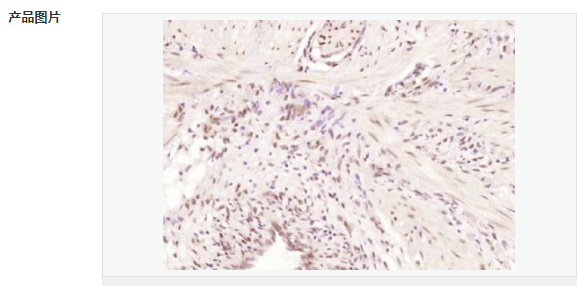

貨號
產(chǎn)品規(guī)格
售價(jià)
備注
BN40418R-100ul
100ul
¥2360.00
交叉反應(yīng):Human(predicted:Mouse,Rat,Dog,Pig,Cow,Horse) 推薦應(yīng)用:WB,IHC-P,IHC-F,ICC,IF,ELISA
BN40418R-200ul
200ul
¥3490.00
交叉反應(yīng):Human(predicted:Mouse,Rat,Dog,Pig,Cow,Horse) 推薦應(yīng)用:WB,IHC-P,IHC-F,ICC,IF,ELISA
產(chǎn)品描述
| 英文名稱 | GEM |
| 中文名稱 | GTP結(jié)合絲裂原誘導(dǎo)T細(xì)胞蛋白抗體 |
| 別 名 | GTP binding mitogen induced T cell protein; GTP binding protein expressed in mitogen stimulated T cells; GTP binding protein GEM; GTP binding protein overexpressed in skeletal muscle; Kinase inducible Ras like protein; KIR; MGC26294; RAS like protein KIR; GEM_HUMAN. |
| 研究領(lǐng)域 | 細(xì)胞生物 信號轉(zhuǎn)導(dǎo) G蛋白偶聯(lián)受體 淋巴細(xì)胞 t-淋巴細(xì)胞 G蛋白信號 |
| 抗體來源 | Rabbit |
| 克隆類型 | Polyclonal |
| 交叉反應(yīng) | Human, (predicted: Mouse, Rat, Dog, Pig, Cow, Horse, ) |
| 產(chǎn)品應(yīng)用 | WB=1:500-2000 ELISA=1:5000-10000 IHC-P=1:100-500 IHC-F=1:100-500 ICC=1:100-500 IF=1:100-500 (石蠟切片需做抗原修復(fù)) not yet tested in other applications. optimal dilutions/concentrations should be determined by the end user. |
| 分 子 量 | 34kDa |
| 細(xì)胞定位 | 細(xì)胞漿 細(xì)胞膜 |
| 性 狀 | Liquid |
| 濃 度 | 1mg/ml |
| 免 疫 原 | KLH conjugated synthetic peptide derived from human GEM:201-296/296 |
| 亞 型 | IgG |
| 純化方法 | affinity purified by Protein A |
| 儲 存 液 | 0.01M TBS(pH7.4) with 1% BSA, 0.03% Proclin300 and 50% Glycerol. |
| 保存條件 | Shipped at 4℃. Store at -20 °C for one year. Avoid repeated freeze/thaw cycles. |
| PubMed | PubMed |
| 產(chǎn)品介紹 | Gem belongs to the Rad/Gem/Kir (RGK) subfamily of Ras-related GTPases, which lack typical C-terminal amino acid motifs for isoprenylation. Rad and Gem bind calmodulin in a Ca2+-dependent manner via this C-terminal extension, involving residues 278–297 in human Rad. High intracellular Gem levels, which interact with intact microtubules and microfilaments, promote profound changes in cell morphology. Ectopic Gem expression is sufficient to stimulate cell flattening and neurite extension in N1E-115 and SH-SY5Y neuroblastoma cells, suggesting a role for Gem in cytoskeletal rearrangement and/or morphological differentiation of neurons. Gem was also observed in developing trigeminal nerve ganglia in 12.5 day mouse embryos, demonstrating that Gem expression is a property of normal ganglionic development. The interaction of Gem with beta-subunits regulates Ca2+ channel expression at the cell surface. The human Gem gene maps to chromosome ?8q22.1. Function: GEM belongs to the RAD/GEM family of GTP-binding proteins. It could be a regulatory protein, possibly participating in receptor-mediated signal transduction at the plasma membrane. GEM has guanine nucleotide-binding activity but undetectable intrinsic GTPase activity. Alternative splicing occurs at this locus and two transcript variants encoding the same protein have been identified. Subunit: Interacts with calmodulin in a Ca(2+)-dependent manner. Binds ROCK1. Subcellular Location: Cell membrane; Peripheral membrane protein; Cytoplasmic side. Tissue Specificity: Most abundant in thymus, spleen, kidney, lung, and testis. Less abundant in heart, brain, liver and skeletal muscle. Post-translational modifications: Phosphorylated on tyrosine residues. Similarity: Belongs to the small GTPase superfamily. RGK family. SWISS: P55040 Gene ID: 2669 Database links: Entrez Gene: 2669 Human Entrez Gene: 14579 Mouse Omim: 600164 Human SwissProt: P55040 Human SwissProt: P55041 Mouse Unigene: 654463 Human Unigene: 247486 Mouse Unigene: 40436 Rat Important Note: This product as supplied is intended for research use only, not for use in human, therapeutic or diagnostic applications. |
